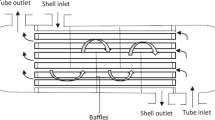Abstract
This paper considers the problem of short-term optimal operation of nuclear-hydro-thermal electric power systems. The solution is obtained by use of a functional analytic optimization technique that employs the minimum norm formulation.
A power system with an arbitrary number of generating stations is considered. The limited flexibility exhibited by the thermal nuclear reactors, when operating in a load-following mode, is accounted for by means of a model of the xenon concentration in their cores. The nonlinear effects induced by trapezoidal water reservoirs and the time delay of the water flow between upstream and downstream hydroplants is taken into consideration as well.
A two-level iterative scheme of the feasible type is proposed for implementing the optimal solution.
Similar content being viewed by others
References
Kiefer, W. M., andKoncel, E. F.,Scheduling Generations on Systems with Fossil and Nuclear Units, Transactions of the American Nuclear Society, Vol. 13, pp. 686–687, 1970.
Hoskins, R. E., andRees, F. J.,Power Systems Optimization Approach to Nuclear Fuel Management, Transactions of the American Nuclear Society, Vol. 13, pp. 768–770, 1970.
Grossman, L. M., andReinking, A. G.,Fuel Management and Load Optimization of Nuclear Units in Electric Systems, Transactions of the American Nuclear Society, Vol. 20, pp. 391–392, 1975.
Chou, Q. B.,Characteristics and Maneuverability of Candu Nuclear Power Stations Operated for Base-Load and Load-Following Generation, IEEE Transactions, Vol. PAS-94, pp. 792–801, 1975.
El-Wakil, M. M.,Nuclear Power Engineering, McGraw Hill Book Company, New York, New York, 1962.
Yasukawa, S.,An Analysis of Continuous Reactor Refueling, Nuclear Science and Engineering, Vol. 24, pp. 239–245, 1966.
Millar, C. H.,Fuel Management in Candu Reactors, Transactions of the American Nuclear Society, Vol. 20, pp. 350–351, 1975.
El-Hawary, M. E., andChristensen, G. S.,Optimal Economic Operation of Electric Power Systems, Academic Press, New York, New York, 1979.
Porter, W. A.,Modern Foundations of Systems Engineering, The MacMillan Company, New York, New York, 1966.
Hamilton, E. P., andLamont, I. W.,An Improved Short-Term Hydro-Thermal Coordination Model, IEEE Summer Power Meeting, Paper No. A77-518-4, Mexico City, Mexico, 1977.
Isbin, H. S.,Introductory Nuclear Reactor Theory, Reinhold, New York, New York, 1963.
Shamaly, A.,et al.,A Transformation for Necessary Optimality Conditions for Systems with Polynomial Nonlinearities, IEEE Transactions on Automatic Control, Vol. AC-24, pp. 983–984, 1979.
Mahmoud, M. S.,Multilevel Systems Control and Applications: A Survey, IEEE Transactions on Systems, Man and Cybernetics, Vol. 7, pp. 125–143, 1977.
Author information
Authors and Affiliations
Additional information
Communicated by C. T. Leondes
This work was supported in part by the National Research Council of Canada, Grant No. A-4146.
Rights and permissions
About this article
Cite this article
Nieva, R., Christensen, G.S. & El-Hawary, M.E. Optimum load scheduling of nuclear-hydro-thermal power systems. J Optim Theory Appl 35, 261–275 (1981). https://doi.org/10.1007/BF00934580
Issue Date:
DOI: https://doi.org/10.1007/BF00934580




